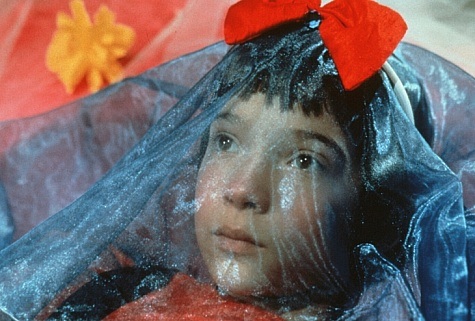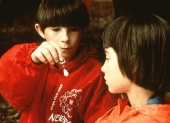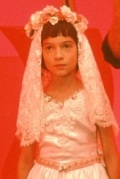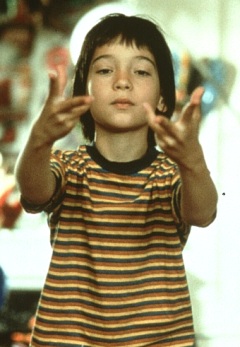|
Film
& Television
|

Georges Du Fresne as Ludovic
Ma Vie En Rose
|
by Peter Herman
|
As
translated into English, the title "My Life in Pink" loses the dual
meaning intended in the French wording. Ma Vie En Rose is about
Ludovic, a seven-year-old Belgian child with an unusual problem.
Ludovic's parents and community perceive Ludovic to be a boy, but
Ludovic maintains an unshakable conviction that she is a girl.
She never loses faith that her physical condition is a temporary
one. This good-natured optimism, seeing life through rose colored
glasses, is the alternate meaning to pink as symbol of Ludovic's sexual
identity.
 As the film opens, the Fabre
family has just moved into an American style suburb and is entertaining
their neighbors with an American style barbecue. The Fabre
children are introduced, but merriment turns to shocked silence when
Ludovic appears in drag, sporting meticulously applied lipstick.
The happy hubbub quickly resumes as Ludovic's statement of sexual
identity is dismissed as a childish prank.
As the film opens, the Fabre
family has just moved into an American style suburb and is entertaining
their neighbors with an American style barbecue. The Fabre
children are introduced, but merriment turns to shocked silence when
Ludovic appears in drag, sporting meticulously applied lipstick.
The happy hubbub quickly resumes as Ludovic's statement of sexual
identity is dismissed as a childish prank.
The parents are initially
calm in dealing with what they consider confusion on Ludovic's
part. They take Ludovic to a therapist. Ludovic does try to
conform. On her mother's urging, she goes along with soccer
practice. There, she earnestly tries on a boy's role, awkwardly
affecting her teammates' macho mannerisms.
 Ultimately, Ludovic is
determined to be accepted as a girl. She falls in love with
Jerome, the young son of her father's boss. When the two children
are discovered performing a marriage ceremony, relations between the
two sets of parents are severely strained. Scandal becomes public
when Ludovic usurps the Sleeping Beauty role in a school play by
locking the little girl destined for the part in the dressing room.
Ultimately, Ludovic is
determined to be accepted as a girl. She falls in love with
Jerome, the young son of her father's boss. When the two children
are discovered performing a marriage ceremony, relations between the
two sets of parents are severely strained. Scandal becomes public
when Ludovic usurps the Sleeping Beauty role in a school play by
locking the little girl destined for the part in the dressing room.
Ludovic seeks scientific
advice from her sympathetic teenage sister. Optimism reigns as
Ludovic interprets the biology lesson. She explains to
uncomprehending parents that her X and Y-chromosomes will eventually
sort themselves out. An unconventional and sympathetic
grandmother provides an emotional anchor for Ludovic. So do
fantasies about Ken and Pam, Barbie like figures inhabiting a pastel
pink world of TV ads.
 There is a strong temptation
to refer to Ludovic as a boy, and indeed, the character is played by a
self-confident Belgian boy quite secure in his male identity.
This information was made apparent to those, including this reviewer,
who attended the premiere American performance at Lincoln Center in New
York City. The audience was treated to a fascinating post
performance question and answer session with the director, Alain
Berliner and the young star, Georges du Fresne.
There is a strong temptation
to refer to Ludovic as a boy, and indeed, the character is played by a
self-confident Belgian boy quite secure in his male identity.
This information was made apparent to those, including this reviewer,
who attended the premiere American performance at Lincoln Center in New
York City. The audience was treated to a fascinating post
performance question and answer session with the director, Alain
Berliner and the young star, Georges du Fresne.
That the star would be
attending became apparent when a boy of small stature accompanied by a
petite, smartly dressed woman came striding through the mostly adult
crowd milling by the theatre entrance. When a small man in his
seventies shyly approached the boy for his autograph, the boy
graciously complied.
At the film's conclusion
members of the audience were given the opportunity to address questions
to both Georges du Fresne and Alain Berliner. Because the boy
could not speak English, his director translated for him.
According to Berliner, du Fresne was chosen for his acting ability and
small stature. At age 11, Georges could believably portray the
seven-year-old Ludovic. Another boy with excellent acting skills
had initially been auditioned. He had seemed appropriate because he
liked to dress in girls’ clothes. He however proved unsuitable
when conflicting emotions caused him to freeze up. Mr. Du Fresne
attested that he had not experienced any emotional discomfort in taking
on this unusual role.
One audience member asked if
the boy had had to face gibes from schoolmates because of his
role. Again, this had not been a problem. Mr. du Fresne's
aplomb in answering questions from the audience matched that of his
extraordinary performance as Ludovic. He left no doubt that he
could negotiate interpersonal interactions as easily as he could take
on the difficult role of a small girl incomprehensibly locked into a
boy's body. Du Fresne’s acting virtuosity is all the more
remarkable when one considers the gulf between a seven-year-old and an
eleven-year-old child.
Alain Berliner was himself
unwilling to put a definite interpretation on Ludovic's predicament,
preferring to leave that up to the audience. It did not matter to
Berliner if Ludovic was potentially transsexual, transvestite,
homosexual or just going through a phase. The real point of the
film was a plea for tolerance. This is a point that all readers
of this Bulletin can agree on.

|
From
the NAMBLA Bulletin, Vol. x, No. x, 1998
|
Copyright © NAMBLA, 2006
|
|
|
|
|

